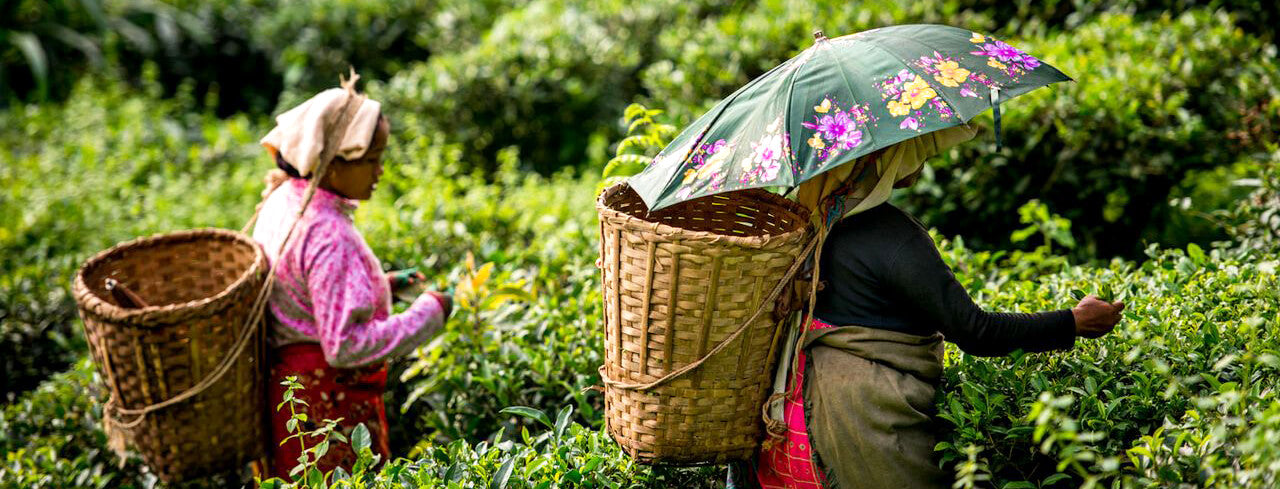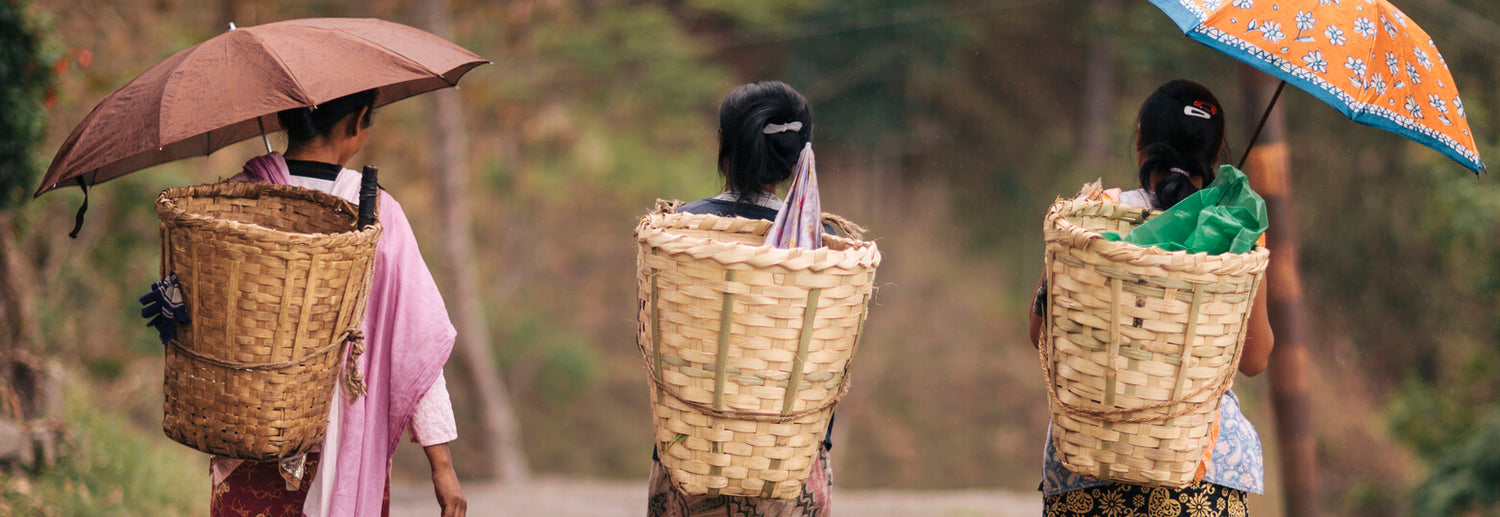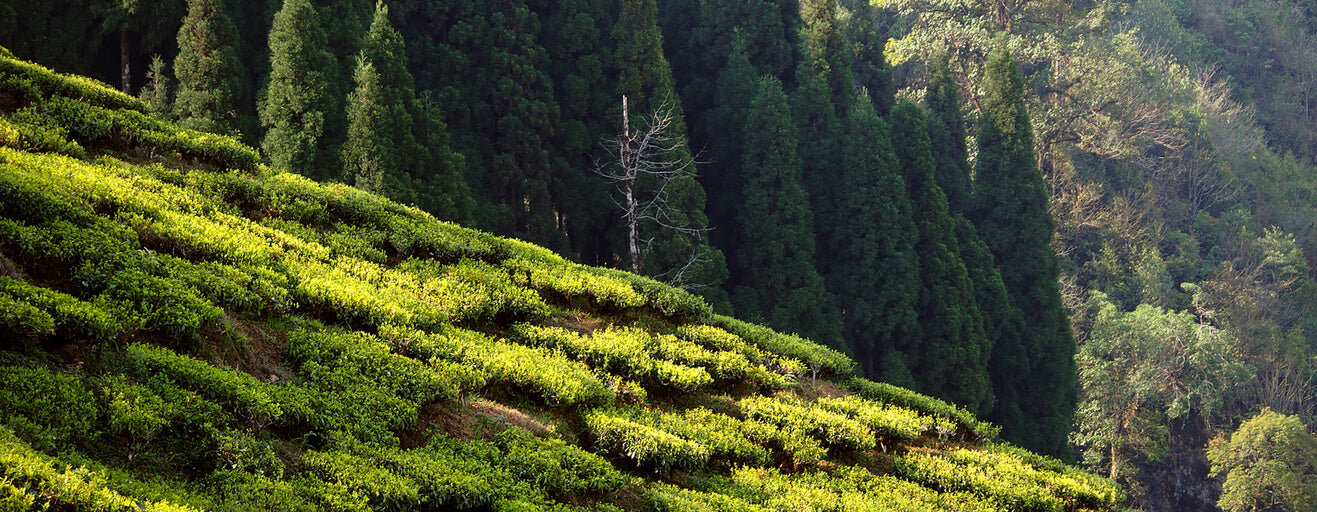Our Code of Conduct
“Our code of conduct starts from uplifting lives of the people in our farmsto bringing a fair, ethical and clean tea to our clients.”
Living and working conditions on our tea estates
The community of people who live and work on our Assam and Darjeeling tea plantations are its backbone. No machine can replace their skills in bringing you the high quality tea that they produce. Tea production is labour intensive, and there are over a thousand workers and their families at both Glenburn and Khongea that form an intrinsic part of the plantations. Although we are governed by the Plantation Labor Act of India, which safeguards the interest of tea plantation workers, the management of Khongea and Glenburn endeavour to provide welfare and benefits to its workers and their families which go beyond what is required by law.



We are members of the Ethical Tea Partnership, and Rainforest Alliance
We are also participants in the Ethical Tea Partnership, a non-profit organisation whose aim is to improve the sustainability of the tea sector and regulate the living and working conditions on tea estates. The Ethical Tea Partnership, in a sense a "Fair Trade" organisation, consists of buyers of tea who together cover around 50 brands on sale in over 30 countries.They have collectively agreed to purchase tea only from producers who participate in their program. Khongea is part of the ETP program, and the living and working conditions are audited by independent auditors appointed by ETP. The ETP program has not yet become available to the Darjeeling tea plantations, however we are one of the tea estates in Darjeeling that is working closely with the board of ETP to bring this program to this region as well.
Being Rainforest Alliance certified means that our workers are trained in using sustainable methods of farming that will protect the tea estate for future generations. We are annually audited to make sure that we are meeting the detailed environmental, economic, and social criteria.
Beyond Certification
We are not satisfied with simply doing enough to meet the criteria for these certifications. We will always go beyond what is necessary, in order to improve our tea and the welfare of our workers. Read more information on the Glenburn Welfare Programme.
Sustainable Agriculture and Organic Tea Practices
Most tea importing countries have strict regulations regarding the amount of chemical residue and other contaminants in tea. We sparingly use chemical-based fertilizers and pesticides to deal with localised issues like nitrogen-poor fields, and fields that may be infested with pests. However, we maintain very strict policies with regard to the spraying of these chemicals. The tea is sprayed judiciously and well in advance of the date of harvesting so that any possible residue is minimised. Our teas are regularly checked in the laboratory for chemical residues that may be hazardous to health. The majority of our fields are healthy and often do not require any interference, and this is what we are aiming to achieve over both our estates in time, leading us to organic certification.
It is also important to understand that the strict Maximum Residue Levels (MRLs) that have been fixed by regulators in importing countries are not only stringent, but these limits have been set for tea as if it is consumed as an edible and raw food item. The chemical residue in tea, as we all know, should only really be of concern if it is water-soluble and has the potential of becoming part of the brew that we drink.
Going Organic in Darjeeling
At our Darjeeling Tea Estate we have begun the process to convert to organic production. For the past 10 years, we have been slowly reducing the amount of chemical pesticides used (more than 50% reduction in the last 2 years alone), as well as adopting organic farming techniques such as the use of vermiculture, organic manure (bought from our workers’ cattle), herbal pesticides, and biofungicides. We now feel confident that moving towards organic production is the right thing for us; it will hugely benefit both the people who work on the estate, and the natural environment that supports it.
Our goal is to become a fully certified Organic Darjeeling Tea Estate. But the process of conversion to organic must be sustainable in order to work. Going organic means significant crop loss in the first few years, so we are starting with the Simbong division (about a third of our tea garden) and will roll the conversation out to the whole estate, slowly and sustainably, once this is successful. As always, Glenburn’s focus is on quality. There are many varieties of organic tea on the market, but we are committed to maintaining our reputation for the best Darjeeling tea. Once we can offer our customers Darjeeling tea that is both premium and organic, we will be very happy indeed.
We are HACCP Certified
HACCP (Hazard Analysis Critical Control Points) is a program that analyzes our production process, ensuring that we have a proper system in place so that our tea is manufactured in a clean and safe environment, free of any hazards. The HACCP program requires us to establish critical points of control to minimize the occurrence of any hazard. Our tea factories maintain records of these control points, which are continually monitored. This enables us to take immediate corrective action when required.
We are a certified Darjeeling Tea Estate
Glenburn is a certified Darjeeling Tea Estate. Only tea that is cultivated, grown and produced in 87 designated tea gardens in the defined region of the District of Darjeeling can be called Darjeeling Tea. Darjeeling Tea has now been registered as a GI (Geographical Indication) in India. This officially places Darjeeling Tea in the esteemed company of Cognac or Champagne - other famous GIs. The unique geographical conditions of Darjeeling help make its teas such a rarity in the same way Cognac and Champagne are rare because they can only come from specific regions of France.
5 Reasons to Buy Our Tea

We provide livelihoods
Unlike other crops, tea is harvested for about 9 months of the year in North-East India, but the tea bushes have to be looked after even when plucking is stopped, in the winter months. This provides employment and a means of livelihood around the year for all the workers who are permanently employed and live on the tea plantation.

We look after our workers
The Indian Tea Industry is governed by the Plantation Act. This law ensures that workers on Indian tea plantations enjoy many welfare benefits that have to be provided by the plantation company. This is not always the case in other tea-growing regions of the world. Tea producers in India are required to provide housing, hospitals, schools and even heavily subsidized food rations to its work force.

We hand pick our tea
Glenburn and Khongea are in premium Indian tea growing regions. A high quality tea can only be achieved by delicately hand plucking each shoot. No tea harvested by a machine can be of as high a standard, as no machine can be as selective in the tea leaves that it plucks. Because of this, the plucking process is environmentally friendly, and does not consume any fossil fuel.

Tea is good for you, and the environment
The benefits of tea are multiple. Tea is not only good for the body, but good for the soul as well! The growing and manufacturing process is also environmentally friendly. Because of the vast expanses of tea fields, tea plantations actually help the environment by being net absorbers of CO2, instead of emitters.

We re-use and recycle
It is our policy at Khongea Tea Estate to uproot and replant 2% of tea fields every year and we have a similar programme at Glenburn. This helps rehabilitate the soil, and reduce the average age of tea bushes, thus optimizing the crop. The uprooted tea bushes are issued as free firewood for our workers, who use it as cooking fuel in their homes.
“Accountable, Dependable and Credible - the code we live by, the responsibility we believe in.”
- Choosing a selection results in a full page refresh.





